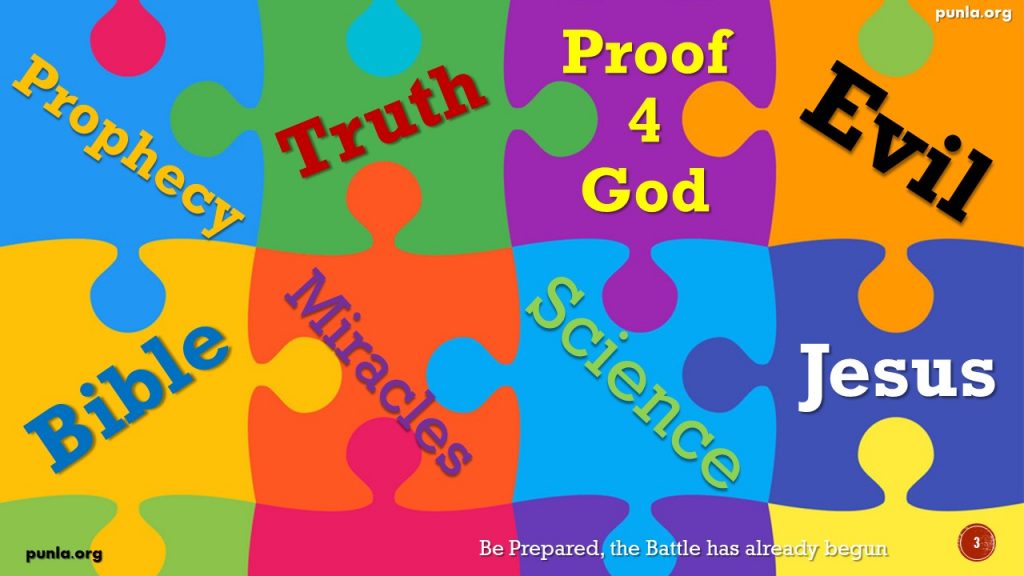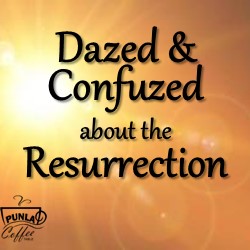Is there a God? Yes there is. Listen to this song written by Rich Mullins and this was a performed as a tribute by Third Day and Brandon Heath.
Amen. I Believe.
Let’s Pray.
I want to highlight three books all written by J. Warner Wallace.
Cold-Case Christianity, which is over there on the table. God’s crime scene and Person of Interest. As you can probably guess from the titles Warner was a police detective. In fact, he is one of the best cold case detectives of all time.

His cases have been featured on Dateline; he was in the God’s not Dead movie Number 2 I think. Anyway, if you like crime dramas or logical thought, this is your guy. He uses his years as a detective and contrasts how he approached his job with how we can be confident Christianity is true. Great books.

Looking at our puzzle, today we will talk about the definitive evidence for God.
Is there a God? I did not hear you.
Why do you say that. Do you have any evidence for that? We need to be prepared to answer this question definitively and clearly. Now, Proof of a god, does not necessarily prove the Christian God. That’s okay. We can prove Christianity is true with other evidence. But right now, we want to discuss the evidence for a theistic God.
And before we get into it, in case you don’t know. We have a preponderance of evidence for God. And not just any god but the God of Christianity.
Now I personally believe what is commonly referred to as the cumulative case approach.
(OBJECT LESSON for Cumulative Case) see video
Cumulative case approach simply weighs the evidence to determine what is more plausible or more probable.
I’m a scientist and engineer professionally, so I do believe that when we look at evidence and data without bias or presuppositions. When science is done properly, we let the data and evidence show us what the most plausible explanation is. Bad science is starting with the conclusion and working backwards. Real science, good science follows the evidence wherever it leads.
What I mean by this for our discussion. I will concede that there is no argument for the existence of God that cannot be challenged by another worldview. We talked about several worldviews that would challenge these evidence a couple of sessions ago when we discussed worldviews.
But what I am arguing is there is a lot evidence God exists. There is far more evidence that points to God than evidence there is not God. I actually want to show you that the more you try to prove there is not God, you will end up back at the feet of God. For reasonable, rational, logical people all roads end up back at Jesus as the only way. You can choose to deny it but you cannot claim you have more evidence against God than for God.
The reason I can say this is people have been trying to disprove God longer than we have had written words. Yet we are still talking about it. The evidence we will discuss has yet to be refuted. Ignored maybe but never honestly challenged intellectually.
Here are three primary arguments you hear the most about.
- Beginnings or Cosmological Argument.
- Design or Teleological Argument.
- the Moral Argument.
I’m going to throw in two other fundamental arguments also
4. the Being or Ontological Argument and
5. Truth which we spoke about in some detail last time.
These are the big arguments or evidence that there is a theistic God.
Beginnings. Cosmos is the universe, so the Cosmological argument is how did everything become everything. And everything has a beginning, so there is a necessity for a 1st cause, cause. They call this the cosmological argument but we can call it the Beginning Evidence.
Another is Number 5, we talked about this last time. There has to be source of objective absolute truth. Truth can’t be relative or subjective. And in fact we as Christians know that truth is a person, Jesus. So, the need for a standard or basis of truth is great evidence for God.
Another is number 3. It is tightly related to #5. Moral and ethical standards. Or what people refer to as the Moral argument. This is the Morality evidence.
Another is Number 4. This one will make your head hurt unless you like philosophy. It is the “being evidence.” Or what theological types call the Ontological argument.
And last but not the least is number 2, the Teleological argument. Everything appears to be designed. Teleo means design. Design infers a designer. Everything appears to be designed.
And in fact at every level of existence from the universe to subatomics particles, everything shows evidence of a extremely precise design or designer.
And we will talk about what points to this fine tuned designed at each of these levels of existence.
And there are many other evidences for God. This is not a complete list, but you can get the idea.
- Data the fact we can collect information is strong evidence of something beyond random chance.
- Aesthetics. Why are things beautiful.
- Consciousness. We have a mind but its more than our brain. We have unique thoughts.
- Mathematics, logic and reason. This highly orderly universe is not random at any time. Science itself rely on many presuppositions that cannot be arrived at using the scientific method. Where do they come from?
- Purpose & Meaning.
- Jesus both His historicity and the evidences for the resurrection point to the Christian God.
- Miracles and the supernatural.
- Other spiritual encounters including what we call the metaphysical.
- Near death experiences.
- And there are many many more.
We are going to concentrate on these arguments in the next couple of sessions.
In fact we have already talked about Truth in our last session. Truth points to a truth standard. There is no worldview that can explain the source of objective truth except a theistic God. Many have tried but they simply do not have as much evidence for their proposed source of truth. From a cumulative case model, the most logical, rational and reasonable source of truth is a God.
We will probably not get to the design argument in this session. But next session we will look at it in detail. So for the remainder of this session we will concentrate on these three arguments; Beginnings, Morality and Being.
I want to start with the Ontological Argument.
This is the argument of “being.” If you like philosophy, this is going to be the argument for you. If philosophy makes your head hurt, this one will definitely make your head hurt.
To be honest, this is not an argument that most people use today, but it is still a very compelling argument. So, what is Ontological whaty. It is a branch of metaphysics dealing with “being.” It is from the Greek word Onto or Ontos which means individual, being or existence. so Ontology is the study of existence or study of being.
The Ontological argument for the existence of God goes like this. Logical proof for God’s existence is based on the idea of God as the greatest conceivable being.
The ontological argument for God was thought to be first formulated by St. Anselm. Who was a medieval monk and philosopher. He argued that nothing greater than God can be imagined or conceived. Therefore, God must be.
Anselm claimed that if God exists only in the mind, then a greater being could be conceived, namely one that really exists in reality. Therefore, God must exist in reality.
The ontological argument has been challenged and modified by various thinkers, such as Descartes, Kant, and Plantinga, who have offered different versions or criticisms of it.
Here Descartes Ontological argument. “We have the concept of God as supremely perfect being. Existence is a perfection: a being that exists is more perfect than a being that does not. A supremely perfect being must have all perfections. Therefore, God must exist.”
Some of the main objections to the ontological argument are that it begs the question, that it confuses existence with a property, and that it does not account for different persons conceptions of God.
The ontological argument remains a fascinating and controversial topic in philosophy and theology, as it explores the nature and limits of human reason and language.
Okay, I am sorry. I’m sure that was way too much Philosophy “speak” for many of you.
This is the end of How to Defend your Faith Session 4: Evidence for God (Part 1 of 3)


